 “Whoever does not receive the kingdom of God as one receives a homeless person will never enter it.” Here are some streams of thought that sprung from my sermon prep on Luke 18:15-30 (which is posted fully at the end). For now, this passage is two stories that are most definitely linked together: Infants and children being brought to Jesus for a blessing, being told that the kingdom of God belongs to them, and a rich young ruler who asks how he may obtain eternal life. Additionally, the previous Wasted Blog post is a part of this stream of sermon prep thought: A blunt text, rationalizing, and a confession: a brief reflection on Luke 18:22. There is little doubt that this is about the gospel and the poor: who are we?The wider section of Luke 14-18 that we have been journeying through during the Saturday Sidewalk Sermons and Sunday morning sermons reveals whom we are to seek and welcome to the Table of God‘s Kingdom--that is, whom are to be invited to salvation in Christ, that is eternal life. There is little doubt, the invitation is for the least among us . . . don’t get me wrong, of course, the wealthy and well-off and those who have the privilege and blessings of this age’s systems and structures are invited to come sit with them (it seems this is the Gospel process). In our current passage (Luke 18:15-30), the young rich ruler is instructed to give his wealth to the poor . . . two things to be noted here: 1) for those that didn’t catch this earlier on my facebook feed, this principle was understood by both Jesus and his disciples as a principle to be followed broadly by the rich if they were to be followers of Jesus; and 2) this was what Jesus was modeling--something this young rich ruler could not, in the end, imagine doing, for he walked, sadly, away from Jesus’ gracious invitation to enter the kingdom of God. Perhaps on this Day of giving thanks, we can find a way to give away what we have to the least among us. Most of us will give thanks around a Thanksgiving table for the bounty God has given to us--often accompanied by a comparison to those who have little or nothing (“Lord, we thank you for what we have, for we know that so many are not as fortunate,” et al.) . . . this is more in line with the Pharisee in the preceding parable, who compared himself to others. The parallel in the Luke 6 Beatitude: The kingdom of God belongs to the poorA thought from my sermon text, Luke 18:15-30: the reference to the kingdom of God belonging to the children means these two stories are a poor vs. the rich contrast and we should suspect that deconstruction, a reversal, is afoot: V. 16: But Jesus called them to him, saying, “Let the children come to me, and do not hinder them, for to such belongs the kingdom of God” (ἐστὶν ἡ βασιλεία τοῦ θεοῦ). Note the parallel: Luke has already told us back in chapter 6 that “Blessed are you who are poor, for yours is the kingdom of God” (ἐστὶν ἡ βασιλεία τοῦ θεοῦ. 6:20). And surprise, surprise, the very next thing is a scene of a rich young ruler wanting eternal life (i.e., entering the kingdom of God), who is then told to give to the poor, and walks away from (eternal life!) “because he was wealthy.” Recall how Luke presents the Kingdom Beatitudes back in chapter 6 . . . he parallels the poor/kingdom (6:20) with “But woe to you who are rich, for you have received your consolation” (6:24). I’ll leave it right here . . . Love God, Love Your NeighborLuke 18:16 (just a verse from my whole text, Luke 18:15-30): “But Jesus called them to him, saying, ‘Let the children come to me, and do not hinder them, for to such belongs the kingdom of God.’” When the rich young ruler had heard Jesus say that the kingdom of God belonged to incomplete adults, those not fully human, that is children, this begged a question pertinent to his station and social status (which was good because he was wealthy, which meant he had a name that counts and a status that allowed all the privileges and, of course, he was a grown male which made him fully human). That question was, “Good Teacher, then how do I inherit eternal life*?” He obviously knows how to inherit riches: be born in a legacy family and be a grown male—this is the Rome-way. It is not Jesus’ way . . . this is what concerns that rich young ruler. As it should. As it should also concern us. While Jesus is far more than a mere Teacher as the rich young ruler had addressed him, he picks up on the word “Good” to help the young rich ruler grasp he is asking a first-commandment question—God is the only good, so remember, Love the Lord Your God first—but in the next breath Jesus directs the wealthy ruler to the second--which is like the first (cf. Matthew 22:39)—command, namely to Love Your Neighbor. Thus, give-God-all-you-got is to be met with selling-all-you-got-and-giving-it-to-the-poor, these are the twin sides of inheriting—not earthy riches, that’s easy, just be born with a name and have the right address—of inheriting eternal life. Not sure we’ve actually come to grips with this side of the gospel . . . it’s there, right in our text for Sunday morning (Luke 18:15-30). *The kingdom of God, eternal life, and being saved are all interchanging terms and concepts in Luke. An ellipsis: whoever models Jesus gets to enter into the kingdom of GodI grant the last of this thread is far more application than exegesis (but it’s that, too), yet it is an application that is a faithful reading and dynamic equivalent [you’ll see I do some translating here] to Luke’s and Jesus’ narrative intent (and of the Greek) found in Luke 18:15-30, specifically, verses 16-17: “But Jesus called them to him, saying, ‘Let the children come to me, and do not hinder them, for to such belongs the kingdom of God. Whoever does not receive the kingdom of God like a little child will never enter it’” (ESV). There are a number of things that are before us in the text, for they would have been before both the original audience of disciples and Pharisees, and, as well, those to whom the Gospel was written, namely Theophilus’ church community: 1) As already mentioned, infants and children would have been considered not fully human, incomplete adults, one the lower tiers of human hierarchy, both in the Jewish and the Greco-Roman world; 2) Children/infants simply would not have been presented, especially in public, to any Rabbi (and I note that Jesus is referred to by the rich young ruler as Teacher, aka a rabbi); 3) There would be ritual impurity amid the presentation of the infants that would have been improper for Jewish Rabbis, but obviously Jesus is impervious; and 4) Finally, there is an ellipsis in verse 17 that needs to be understood. Allow for an explanation of the ellipsis before moving on to my application (which reveals the intent of Jesus and Luke here): a grammatical ellipsis, whether written or spoken, is when some words are missing yet assumed, offering some balance to the thought or sentence that is implied by the author and supplied by the hearer/reader. Examples: “John saw two hawks in the sky, and Bill saw three” and “Amanda is managing the restaurant Thursday, and Joseph is Friday.” The second example is like our Luke 18:17 ellipsis, in that the verb “manage” is left out but is clearly intended. The ellipsis in Luke 18:17 is the verb “receive.” The ellipsis is masked by the English word “like” (i.e., “like a child”). The word “like” implies to the English reader that it is the children we should be like. However, the ellipsis being crafted here is to imply that it is the “receiving” that we are to be like. Here’s my translation so you can here and see how the ellipsis works:
The “infants” and “children” are not coming or receiving Jesus in this story. They are not coming to Jesus because of something about them--we infer this, but it is not there in the text and the social/cultural location suggests otherwise. And, it is the parents who are bringing them to Jesus and Jesus is receiving them. Thus, the set up for the intended ellipsis. We should make a narrative link to what Jesus is doing. This is exactly what Jesus is modeling, “receiving children.” He is not receiving children as a child or like a child would--that’s our hallmark-card spin on it--but Jesus is doing the receiving, the welcoming of the children. This reading of the text, and hearing the cultural view of humans that is at play, allows us to apply this warning concerning the unavailability of the kingdom to those who do not welcome/receive children because Jesus has reversed the poles in His kingdom. Now, if we read--as we should--the other aspects before us in this text, namely infants/children would have disturbed the piety of a rabbi (i.e., the clean vs unclean) and the view that receiving them counters the tiered humanity prevalent at that time . . . it would be fair to render this verse: “Whoever does not receive the kingdom of God as one receives a homeless person will never enter it.” Of course, you can change “homeless” to be anyone whom you believe is less than human or unclean . . . and not only believe, but live in such a way that your modeling is nothing like Jesus’ model . . . and the danger? You will not enter the kingdom of heaven. This is affirmed by the next story of the rich young ruler choosing not to model Jesus and turns away from the kingdom. Luke 18:15-30 (ESV)
0 Comments
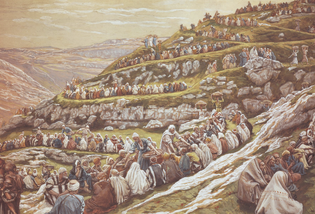 The feeding of the 5000 in Mark 6 is a miracle story that reveals who Jesus is—most assuredly. Yet still, Mark’s purpose in writing a gospel for the church community in Rome to be read out loud at the symposium following their supper gatherings (what we might call a church gathering) was to build the church, mature the congregation’s faith, and teach what it means to follow Jesus and acknowledge him as Lord, raised from the dead. More so, Mark’s Gospel, including this feeding of the multitude story, was (and still is) to prepare the church for the persecution, hardship, and the difficulty of being the church while staying faithful to its mission and Lord. The Mark 6 feeding of the five thousand is as much about who the church is as it is about who Jesus is. While the miracle itself is revealing of who Jesus is and certainly links the reader back to the Old Testament Exodus under Moses (thus, picturing a new exodus under One better than Moses, giving the new mana), this is a discipleship story that has a discipleship point to be made to the readers/listeners. First, three times in the space of five verses the word “desolate” (“desert,” actually, “wilderness” is best) is used in a fourteen-verse story—over a third of this vignette on the feeding the 5000 focuses on where this event takes place. And, if we count the reference to “green grass” (v. 39) where Jesus had the crowd sit to be served, this story does indeed focus the reader/listener’s attention on the place of this story; thus, giving a clue to its importance on the subject of discipleship--what does it mean to follow Jesus? Second, the story is mostly about the newly appointed “apostles,” the twelve “sent ones” (6:7-13), who had just returned (v. 30) from the mission Jesus had sent them. The story begins with their return, reporting, and Jesus taking them to some spot—a “desolate place,” a grassy space of wilderness—to eat and rest. “Leisure” (as in “had no leisure even to eat,” v. 31c) is an unfortunate word choice of the ESV, for it gives the impression of fun, earned vacation or a weekend (perhaps), or an extended break from work—here, it simply means a few moments to rest so the disciples can eat. Then, after finding their own “desolate” place to eat, the crowd from nearby towns followed and found “them” (v. 33)—Jesus and the disciples, who had just been going through their towns preaching the kingdom of God. After Jesus spent some time teaching the crowd, the apostles “kindly” mentioned to Jesus that the crowds, who had followed “them” to their desolate place (v. 33), needed to find their own food in some other place (vv. 35-36). While we often focus on Jesus in this story, Mark keeps the “apostles” front and center. Just after the disciples request the crowd be sent away to buy their own food, Jesus instructs them: “You give them something to eat” (v. 37a)--they were their eating (by-the-way) and obviously had food; something from their own resources. Still complaining, the disciples sarcastically say, “Shall we go and buy two hundred denarii worth of bread and give it to them to eat?” (v. 37b). (The disciples really wanted to get this crowd to go away!) Paying no mind, Jesus asks them to gather what they had left from their food—“Five [loaves], and two fish” (v. 38c). Then, Jesus instructs the 5000 to sit in groups of hundreds and fifties (like Moses did) and after blessing this paltry amount of food for such large a crowd, gives the food to the disciples to set before all the people—in other words, to serve the crowd food in that desolate place they had originally found to “get away and eat themselves.” A quick aside: The miracle in this story is very linked to the disciples, for the multiplying of the bread and fish come, not in some surreal miraculous moment, but through the serving of the bread and fish by the disciples—so even here, the story focuses on the disciples. As you can see, while the feeding miracle stands out (and is, of course, important), but the story has the multiplication of the loaves and fish in the serving by the disciples to the people. The content of this story focuses our attention on the disciples—more so, on a discipleship moment. So what’s happening here? Yes, at the very moment the new exodus is revealed, displayed in the feeding of the 5000, and Jesus is revealed as the ultimate Moses, the disciples first find a spot to eat and are interrupted by the crowd who had followed “them” to this desolate place, and, then, wanted to turn them away when it was time for the crowd to eat. There is some irony here for sure. As I had mentioned before in a previous Facebook post: I believe, the readers on this side of the text are to hear that Jesus is setting his disciples up for a lesson—a learned experience, a discipleship moment—in what it means to be a disciple, a follower of Jesus. We, his church, Jesus’ disciples are how the bread and the fish multiply. This is revealed in the focus on the disciples and the desolate place in this story. Later, after the resurrection and as the church increased, this can be seen in the multiplying of tables (in supper rooms) of gathered believers starting in Jerusalem and spreading all the way to Rome and eventually filling and overtaking an empire. We can see this revealed in the multiple references to supplying the needs of the poor in the New Testament. And, that the original (not so much, sadly, later in church history, even up to now) gathering of strangers and unequals (i.e., gathered churches) provided a platform and venue for the poor’s needs to get met, including a meal. The Lord’s supper was a supper after all. We learn of discipleship here: following Jesus is going to interrupt a disciple’s life. Needs are going to be met out of His disciples resources. Meeting needs in inconvenient space, space we thought was for our leisure, is a sign that the Kingdom of God has come. It is proclaiming Jesus—of course use words. But that’s what the disciples did on their short-term mission just prior to this episode. So, the narrative point (Mark’s narrative point) was to move the disciple’s notion of ministry beyond words to illustrating the arrival of the Kingdom in Jesus. Remember, the miracle of multiplying the food was through the serving of the disciples—just at the time they needed rest and needed some leisure time. Ministry and mission, meeting needs and serving—all should be expected to interrupt and invade our leisure space.
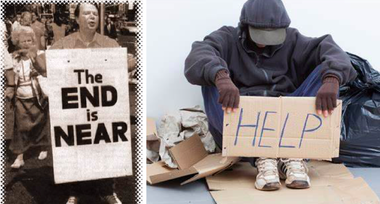 We’ve come to an “end time” text in Matthew, chapter 24. Too many Christians, preachers, and modern, self-appointed “prophets” mine this chapter in search for how they may “discern” the signs so they can announce “the end is near” (usually accompanied by some action that is needed, everything from send money, give more money, stop letting, go vote . . .) Even though we have 2000+ years of everyone getting it wrong, plenty still predict and announce. When I was pastoring in Pennsylvania in 1987, I received a free book in the mail, 88 Reasons Why Jesus is Coming Back in ’88. Well, Jesus didn’t. So the next year, I received a new book from the same author entitled, 89 Reasons Why We Were Wrong in '88 and Why Jesus is Coming Back in ’89. You can’t make this stuff up. Well, here we are, it’s 2019. And, we still have sign pointer-outers and prophetic manipulators and, even, innocent, well meaning Christians seeking signs and pointing out why “we’re living in the end times.” If you skim through Matthew 24 and Matthew 25 (which should be like one chapter together) you will encounter the twin themes of “it’s not the end” and “you don’t know when the end is coming so be ready.” So, perhaps we should take this to heart and listen better to Jesus. Being ready isn’t about discerning the times and looking for signs, but enduring to the end. “You see these sign, endure to the end (since you don't know when it’s the end end).” What’s truly interesting, the parables that follow the “signs” section of Matthew 24 all push the reader toward being ready because you don’t know when it’s the end end. There are some important parallels we gloss over, or ignore, or don’t take into account, namely each of the parables–the faithful servant (24:45-51), the ten virgins (25:1-13), and the “faithful/unfaithful investors” (25:14-30) and the “sheep and the goats” (25:31-46)–all end in pretty harsh judgement . . . Matthew intends some parallelism here . . . they are all teaching basically the same thing. So, this is important to grasp. While waiting and being ready and seeking to endure, the Christian community is to be characterized by . . . go ahead, read Matthew 25:31-46 . . . you got it . . . by feeding the hungry, giving drink to the thirsty, by welcoming the stranger (don’t think US Border, that, too, is a misdirection; think your home, your church, your neighborhood, your circle of friends and acquaintances), by clothing the naked, and by visiting the sick and imprisoned. Matthew connects the “end times” teaching and the “sheep and the goats” judgment, so we should as well. Church is expected (a church in a place, in a neighborhood is expected) to live (together) in such a way as to create space (i.e., habits, lifestyles, life) to make it possible for the hungry to be fed and the stranger welcomed and the sick and imprisoned visited for the “end” is nigh in that Christ Jesus comes to us in the poor, the hungry and thirsty, the naked, the sick, and the imprisoned. So, Christian, stop seeking signs. Endure ’till He comes by doing what Jesus has been doing (in Matthew since chapter 4, i.e., ministering to the poor, the outcast, the unclean, the marginalized, et al.). Stop pointing out signs (“Oh, it must be the end, see how bad it’s getting!” or “Look what’s happening with that country . . . or those politicians . . . or those people!”). Just stop it. And, stop listening to it. It’s distracting you from true endurance, which means actively helping, serving, caring for the poor, the outcast, the marginal, the unclean.  Furthermore, there is an interesting twist afoot when we consider the thread of “second coming sign” texts in Matthew 24 and the juxtaposition of the three Matthew 24-25 parables and the parable of the sheep and the goats: The three parables, along with the noted (above) harsh conclusions, are also stories about a Master delayed (χρονίζω, chronizō) and who comes (24:48-50), a bridegroom delayed (χρονίζω, chronizō) and who comes (25:5, 10), and a Master who goes on a journey, “yet after a long time” (μετὰ δὲ πολὺν χρόνον, meta de polun chronon)* comes (25:19). Then in the sheep and the goals parable (25:31-46), we have the Son of Man (i.e., Jesus) who comes (25:31). Here, we have a slight nuance to the concept of “coming,” namely the “coming” judgment is based on the incidences of Jesus coming in the persons who are poor, neglected, under-resourced, unclean (i.e., hungry, thirsty, naked, homeless, sick, and imprisoned). Of course there is a final “coming” when Jesus, as the Son of Man judges and separates the sheep and the goats. Yet, this coming-judgment is based on what the people (i.e., Christians, at least outwardly) do and do not do to/for/with the Jesus who had come as someone hungry, thirty, naked, homeless, sick, or imprisoned: “Truly, I say to you, as you did it [or not did it] to one of the least of these my brothers, you did it [or not did it] to me” (cf. 25:40, 45). It seems clear, from the parallels in the parables and the juxtaposition of the coming-judgment of the sheep and the goats, that is, being ready, staying alert, staying woke while Jesus “delays” and being prepared for the final coming is repeating the same ministry that Jesus had illustrated (i.e., the fishing) in Matthew 4-23, that is healing and touching and feeding and caring for the poor, sick, and unclean. The true signs of His coming is the church among the poor, outcasts, marginalized, and unclean. Don’t be a goat (nope). Be a sheep. Be ready. Be prepared. Be truly woke . . . when Jesus comes to you as one of the least of these (or go to them, be among them), so that you may be ready when he comes as the Son of Man on that Day.
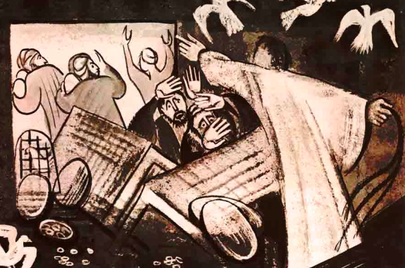 We will take a look at the “Triumphal Entry” story in Matthew 21 on Sunday morning. The population of Jerusalem, normally, was about 30,000, yet with the passover and all its events and activities, the city's population had grown far beyond its capacity to about 180,000. Inns were full. Family homes packed to overflowing with relatives. Camps of make-shift tents filled almost every space around the city and its outer hills and valleys. And, then, Jesus arrives. The crowd cheering him on as he rode that colt of a donkey was not (necessarily) only visiting guests and residents of Jerusalem that day, but the throngs, that is, the crowds that had been following him from Galilee--many were Galileans for sure (very much outsiders), but certainly many of those whom Matthew has already described to us elsewhere:
We know this crowd was following him down to Jerusalem: “And as they went out of Jericho, a great crowd followed him” (19:29). The sheep-without-a-shepherd crowd that Jesus had compassion for (cf. Matthew 9:36), these had followed him to the city and are, most likely included in those cheering the arrival of Messiah, of the King, who had come to save them all. In fact, we know this by Matthew's own accounting, for after the table-turning event that cleared the temple court of illegal and irreverent merchandizers preying off the weary travelers coming to Jerusalem for the Passover, he writes: This happened in the cleared court of the temple. Matthew tells us, as the events that day in the temple unfolded, that the Jerusalem crowd had asked "Who is this?" for the "whole city was stirred up” (v. 10). Of course it was, this Preacher from Galilee had arrived, acting all king-like on that colt of a donkey, and the throngs of outsiders, many considered unclean, that had been following him were now occupying the temple courts and disturbing the social and religious festivities. The unclean (blind and lame) and those outsiders in the temple! Outsiders. Lame. Disabled. Demon-posessed (many whom Matthew's story thus far has told us were freed). The sick. Infirmmed. Those with seizures. And, their families. Did I mention outsiders? Galileans. And, even those perhaps from as far as Syria (Matthew 4:24). Throwing down palm branches. Shouting, “Hosanna to the Son of David! Blessed is he who comes in the name of the Lord! Hosanna in the highest!” (21:9b). All proclaiming Jesus as king of Israel. And, then, Jesus makes space in the temple for them. All this was not received well by Jerusalemites (i.e., the probably crowd shouting condemnation before Herod later in the story) nor, especially, the temple-leadership (v. 15). When Jesus tells the two parables of the one son who rejected the Father's work and how the first disrespectful son repents and does the will of the Father, and the fake, greedy servants killed the Father's son . . . it is no wonder the temple-leadership felt this all was about them. Now, to do away with this king, this messiah . . . How can we, today, as church, run away from the inspired narrative that clearly shows that Jesus accepted the blind and the lame (surely a summary of all those sick, oppressed, and poor) into the temple, upsetting the status quo, deconstructing the religious institutional bias toward the powers and powerful, the wealthy and affluent? What do we make of this? Church, we need to do better. O, Christian, we need to rethink church.
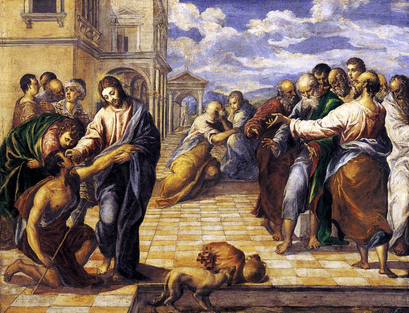 The unpardonable sin? What is this? Have I committed it? If you have, the ball game is over, done, finished. You can never ever be pardoned. Ever. According to both the Matthew 12 and Mark 3 unpardonable sin texts. And, this pastoral nonsense, that is, "well, if you are concerned about it, then you haven't committed blasphemy of the Spirit" is not in these texts as a way around it. Yet, pastors and lay-people/teachers use this "counsel" all the time. It seems the default pastoral answer. (How do pastors know this, anyway?) But, whatever it is, it is serious stuff. So, I believe the better question is, how should we read this "blasphemy of the Spirit" text in Matthew 12? And, what does it mean to the church that reads (in Matthew's Gospel) this rebuttal and warning from Jesus to the accusing temple leadership? This “sin” from Matthew 12 (cf. Mark 3) have been misappropriated so much that it fits the adage, if you keep telling a lie over and over again eventually everyone just thinks it to be true. Although, preachers and teachers might certainly not be lying, they have, however read back into these texts what has “always” been clear since it seems true and has been repeated over and over (so they repeat). Let us, however, look at the logic (the simple grammar and the context) happening in the Matthew 12 “blasphemy against the Holy Spirit” text. The unpardonable sin referenced here has to be related to the previous verse (the one that heads the paragraph, verse 30), for the warning of such blasphemy against the Spirit begins with a “therefore” (v. 31; Διὰ τοῦτο/dia touto, literally “on account of this,” “because of this”). So, the reader must ask, “therefore what?” or “on account of what?” Well, verse 30 is the answer:“He who is not with Me is against Me; and he who does not gather with Me scatters.” So, the “sin and blasphemy” is related to the one who “is not with” Jesus, but is “against” Him. And still, the “is not” and “against” is very specific—it is not a general “anyone who isn’t a Christian” or “any who reject Jesus” (which neither are in the text—yet, we continue to back this understanding in to the text). No. The one who “blasphemies against the Spirit” is the one who scatters and does not gather (based on verse 30). This is a leadership sin, a leadership blasphemy. At least here in this text. It is a rebellion right at the top. For, the terms “gather” and “scatter” are shepherding terms, which are very appropriate to the context Matthew gives to this narrative. Earlier, Jesus is looking upon the marginalized, oppressed, the poor, the bottom demographics and says, “Seeing the people, He felt compassion for them, because they were distressed and dispirited like sheep without a shepherd” (Matthew 9:36). This is what is clear from the text. Blasphemy against the Holy Spirit is related to the absence of shepherds that care/guard/protect the sheep, that is, sheep who are among the “distressed and dispirited” (FYI, this is the meaning of “poor in spirit,” but that for another time). The no shepherd/scattered-lost sheep portrait is pulled from Ezekiel’s prophecy and warnings (how about that, a warning!), and, specifically, Ezekiel 34:5: “So they were scattered, because there was no shepherd . . . My sheep were scattered.” Also, interestingly, Ezekiel portrays the restoration of God’s people and their return to covenant faithfulness as facilitated by the . . . wait for it . . . the Spirit (Ezekiel 36-39); thus, further linking our “blasphemy against the Holy Spirit” in Matthew to Ezekiel’s prophecies and warnings. Thus, we need a reading of this text with the no shepherd/scattered sheep framing in the narrative. Finally, it is important to note that Matthew has already set this all up in narrative. How do people know that Jesus is the promised Messiah: What do they hear and see? blind receive sight lame walk lepers are cleansed deaf hear dead are raised up poor have the gospel preached to them (Matthew 11:4-6). No doubt this is Matthew’s version of Luke’s draw on Isaiah 61, which promises that God’s Spirit (how about that, the Spirit again) would be on the Messiah to preach the gospel to the poor, to heal, free, and bring justice (Isaiah 61:1). This is the context in Matthew. This is exactly what Jesus is doing: He is fulfilling the Isaiah and Ezekiel vision of future redemption. This is what the temple and synagogue leadership miss, ignore, or are fighting against. So the blasphemy of the Spirit–the unpardonable sin–is more closely related to the role of shepherds in relation to sheep, that is, leaders among God's community and the sheep appointed to their care/protection (i.e., in Israel's case, temple-leadership; in our case, church leaders) that do not consider the poor or design (religious or church) systems that marginalize the poor (e.g., unintended consequences or purposeful matters not). In other words, to not do as Jesus did, that is, in having compassion for the despised, distressed, and bottom demographics is to deny that the promised time of redemption has arrived and, thus, is not forgiven—forever! The "sign" of the kingdom of God's arrival was (and I cannot find in the NT anywhere where this has changed) that the gospel was preached to the poor, the oppressed set free, and disabled walk. This is affirmed in Matthew's Gospel. The whole "blasphemy of the Spirit" episode hinged on Jesus casting out demons and healing a deaf mute so he could hear and speak, a sign of God's kingdom and that Jesus is the Spirit-anointed Messiah. Thus, the narrative meaning of the blasphemy of the Spirit, which is clear and can be inferred by a faithful reading of the text and context, is to stand in rebellion against the inauguration of the kingdom of God and to shame (lower the standing) of Jesus. Rejecting (hindering, acknowledging, ignoring) the kingdom's presence signaled by God's concerned for the poor et al. is, well, blasphemous. *I have not spoken to the issue of "honor/shame," which is most certainly an element framing Jesus' hostile encounter with temple-leadership. The scribes and Pharisees are publicly shaming Jesus, calling Him the son of Satan and empowered by Satan to do "these signs." So, in one public shaming Jesus is put down and His miracles were not the true signs of the kingdom of God. This isn't just about call good evil and bad good; this is about wholesale disbelief and rebellion against the inauguration of God's reign–which is why it's unpardonable.
|
AuthorChip M. Anderson, advocate for biblical social action; pastor of an urban church plant in the Hill neighborhood of New Haven, CT; husband, father, author, former Greek & NT professor; and, 19 years involved with social action. Archives
February 2024
Categories
All
|
Pages |
More Pages |
|
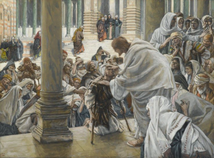
 RSS Feed
RSS Feed